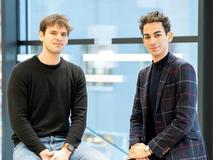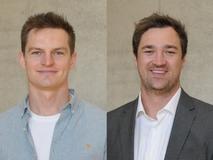CHF 40,000 for a 3D fitting algorithm for online shoppers, a personal metabolic health analysis platform, and a novel rehabilitation system
29.11.2022
Alter Ego, compagOs, and smartVNS win Venture Kick's second stage of financial and entrepreneurial support. Their projects aim to reduce the return rate for online-bought apparel, provide early efficacy tests for bone drugs, and develop a rehabilitation system that uses real-time motion tracking and analysis to control a non-invasive form of brain stimulation.
 |
 Alter Ego's Pietro Zullo and Fayçal M'hamdi
|
 compaOs' team, from left to right: Gian Nutal Schädli, Robert Baumann, Barna Gal, and Chris Steffi
|
 smartVNS's Paulius Viskaitis and Dane Donegan
|
Alter Ego: a 3D fitting algorithm for online shoppers
When buying clothes online, most customers are uncertain about the size that would fit them. Hence, 30% of the ordered articles are returned, and handling these operations costs up to 30% of a company’s revenue. Half of these returns are reported to be due to size fitting issues and 10% of the articles are damaged during the process and then burned. While retailers keep the return process free and easy to encourage shopping, they suffer economically due to the high return rates, all while causing huge environmental damage.
Alter Ego aims to reduce the return rate for online-bought apparel. The team consists of Fayçal M'hamdi and Pietro Zullo, who are both studying at ETH Zurich: Fayçal is currently pursuing a Master's in computer science and Pietro is working on his Master's thesis in robotics. They have developed technology that can extract any body measurement and reconstruct a 3D avatar from one picture and height. They are currently developing a size recommendation tool and a 3D fitting algorithm to allow shoppers to get size recommendations and virtually try clothes in order to not return their purchases. In the short term, their value comes from the impact induced by reducing article returns and support to semi-tailored and push-and-pull production. In the long term, their user base will be broad enough to use globalized data to adapt production for specific areas/brands, thereby reducing waste. The garment market, specifically for online retails, was worth about USD 500 billion in 2020 and is expected to triple in the next 10 years.
The second funding from Venture Kick will be used for legal fees making sure their technology is fully compliant with GDPR; for roadshows needed to meet more potential clients and partners for pilot projects; and, for outsourcing tasks for brand identity and technology development.
compagOs: Enabling personalized medicine to restore bone health
Standard drug therapies for bone diseases are often ineffective. Current treatment options focus on a one-size-fits-all strategy, not taking into account the wide genetic variability throughout the patient population, which leads to varying drug responses. In fact, for osteosarcoma, the most common bone cancer in children and adults, there was minimal progress in drug therapy over the last decades. The long-term survival rate remains below 30% for patients who are diagnosed with metastasized or recurrent osteosarcoma.
CompagOs aims to provide patient-centered services to test the efficacy of drugs on proprietary human bone disease models in a reliable, time-efficient, cost-effective, and safe in vitro environment. Its organoid disease models will be used to create a database of drug responses from a single patient which will help clinical researchers and biotech companies in their development of new drugs, ultimately leading to better treatment for future patients. Furthermore, we will create patient reports from our tests to provide oncologists with the information they need to choose the most effective treatment for each individual patient. In the case of sponsored trials by pharma, our technology platform helps to match patients to the correct clinical trial, ultimately helping to repurpose or approve new drugs. Globally, there are about 26,000 newly diagnosed osteosarcoma patients per year. The technology has great potential to improve treatment outcomes and reduce mortality as well as overall treatment costs, which easily exceed USD 100,000 per patient.
The team is led by Gian Nutal Schädli, Ph.D. in Bone Tissue Engineering and Imaging from ETH, who, together with Robert Baumann, MSc. in Mech Eng, Barna Gal, MD in Orthopedics and Chris Steffi, Ph.D. in Molecular Biology and Tissue Engineering, will drive automation of the technology platform, product, and business development as well as scientific development and validation. The team behind compagOs will help to leverage personalized and targeted strategies to match patients with the best available drug treatment. They strive to provide the best possible therapy for each and every patient.
The Venture Kick funds from the second stage will be used to establish client relationships through pilot projects, advance IP development, and validate the regulatory strategy. www.compagos.ch
smartVNS: novel rehabilitation system
Every year, 8 million people require rehabilitation after a stroke; yet, therapy is expensive and often unsatisfactory and rehab effectiveness is tracked either by simplistic metrics or requires expensive devices. Vagus nerve stimulation (VNS) makes rehab more effective, but existing methods require surgery and constant therapist supervision and are not scalable. Therefore, there is an unmet need for effective, non-invasive, affordable, and scalable tools for rehab and its progress tracking.
SmartVNS was co-founded by CEO Paulius Viskaitis and CTO Dane Donegan, who are both postdoctoral researchers at ETH Zurich. Their innovation is a rehabilitation system that uses real-time motion tracking and analysis to control a non-invasive form of brain stimulation. This is achieved by algorithmically combining two exciting technologies: wearable devices for position tracking and auricular vagus nerve stimulation. The synergy of these methods results in rehabilitation therapy with many benefits compared to existing solutions: a safe, clinically effective way to induce neural recovery mechanisms, continued patient progress tracking for doctors and therapists that enables remote therapy personalization based on patient progress; lower treatment burden and higher efficacy due to closed-loop stimulation and personalization; lower therapy cost due to automation; and, better treatment adherence via therapy gamification.
VentureKick will fund key steps toward the necessary hardware safety and other regulatory approvals in order to get the smartVNS system into patients' hands as soon as possible.


